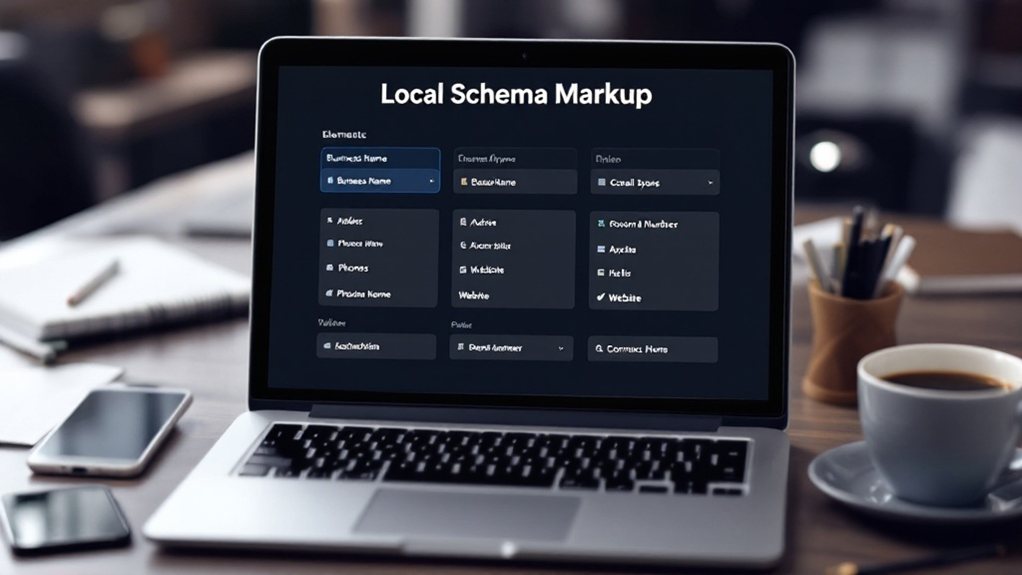To debug and validate your local schema for SEO improvements, start by leveraging validator tools to identify and fix common errors. Ensure you're using the correct schema types and avoiding spammy tactics that can undermine credibility. Utilize schema management tools to streamline the process, and regularly test and cross-validate to maintain accuracy and compliance with Google's structured data guidelines. By following these steps, you'll set the foundation for effective local schema implementation that can drive meaningful results for your business.
Understanding Local Schema Markup Types

Understanding local schema markup types is key to optimizing your website for search engines. General schema microdata helps structure your content, while local business schema focuses on information relevant to local searchers, like business hours and location. Local business schema markup is a type of microdata that can be added to a website's HTML code. Required properties include your business name, address, and a unique ID. Industry-specific markup is available for niches like bike shops and clothing stores. This enhances visibility, increases click-through rates, and prepares your site for voice search. When implementing local schema, use the preferred JSON-LD format and avoid syntax errors. Regular testing with validation tools is essential to ensure proper implementation and troubleshoot any issues.
Choosing the Appropriate Schema Type

Choosing the right schema type for your content is crucial. You'll want to select specific schema types that closely match your industry and the format of your content. Selecting the appropriate schema type is essential for accurately representing your content. Be sure to familiarize yourself with the required properties for each schema type to ensure complete and accurate implementation.
Specific Schema Selection
Selecting the appropriate schema type is crucial for effectively representing your website's content and improving its visibility in search engine results. Whether it's article schema for news posts, product schema for reviews, or event schema for listings, aligning your schema with the primary content focus is key. Additionally, schema like how-to, recipe, and local business can enhance your content's intent and rich snippet visibility. Properly validating schema is essential for ensuring it matches your SEO strategy. Remember to validate your schema using Google's Structured Data Testing Tool and ensure it matches your SEO strategy. By integrating schema correctly using JSON-LD and staying updated on the latest developments, you can optimize your local presence and boost your click-through rates.
Industry-Relevant Types
When selecting the appropriate schema types for your industry, it's crucial to consider the unique needs and characteristics of your business or website. For local businesses, the Local Business schema is essential, featuring details like address, phone number, and reviews. Restaurants should leverage the Restaurant schema to highlight menu items and business information. Ecommerce sites benefit from Product schema, showcasing features like prices and reviews. Event schema optimizes listings for happenings like conferences or concerts. Review and Rating schema builds credibility by displaying aggregate ratings. Thoughtfully aligning schema with your content and industry can significantly enhance visibility and engagement in search results. Implementing schema markup tailored to your specific needs is crucial for driving impactful SEO improvements.
Property Requirement Awareness
Understanding the specific property requirements for each schema type is crucial when implementing structured data on your website. Accurately applying real estate schema like 'RealEstateListing' is key, including details like 'datePosted' and 'leaseLength'. Familiarize yourself with the schema hierarchy, such as 'SingleFamilyResidence' under 'Thing > Place'. Ensure you include all necessary properties, like 'numberOfBedrooms' for 'SingleFamilyResidence'. Leverage tools like Google's Rich Results Test to validate your schema, and regularly update it to reflect changes. Avoid common mistakes like incorrect nesting or irrelevant properties, as these can negatively impact your SEO. Mastering schema property requirements will help you provide comprehensive, indexed real estate listings.
Building Effective Schema Markup

Crafting effective schema markup is crucial for enhancing your search visibility. Schema markup helps search engines understand the context and content of webpages more effectively. Begin by structuring your schema data in a logical and accurate manner, ensuring it aligns with your content. Validate your schema implementation using the right tools to identify and address any errors or inconsistencies.
Choosing Appropriate Schema Types
While selecting the appropriate schema types is crucial for building effective schema markup, it's important to first understand the primary content intent of your web pages. Whether you're showcasing a product, highlighting an event, or sharing an article, choosing the right schema can significantly boost your search visibility and user experience. Schema markup code can help search engines better understand the content on your website, leading to more informative and eye-catching search results.
| Schema Type | When to Use |
|---|---|
| Article | For blog posts and news content |
| Event | To promote upcoming events with details like date and venue |
| Local Business | Essential for brick-and-mortar businesses to include address, hours, and reviews |
| Product | Critical for e-commerce to highlight product details and availability |
| Review | Displays customer reviews and ratings, building trust and social proof |
Structuring Schema Markup Effectively
Proper structuring of schema markup is key to maximizing its benefits for search engine optimization (SEO) and enhanced user experience. Leverage the granularity of schema types to represent your content accurately, and don't hesitate to customize the markup using JSON-LD. Schema types should be selected carefully to accurately describe the content. Automation tools can streamline the process, but monitor performance in Google Search Console to ensure adherence to best practices. Structured data powers rich snippets, breadcrumbs, and voice search integration, so get the details right. Above all, maintain truthfulness and consistency across your markup to avoid penalties and capitalize on the full potential of schema for your local business.
Verifying Schema Implementation
Ensuring your schema markup is properly implemented is crucial for leveraging its full potential. Utilize tools like the Google Structured Data Testing Tool, Schema Markup Validator, and Screaming Frog to thoroughly validate your schema. Watch out for common errors like incorrect formatting, missing properties, and vocabulary misuse. Incorrect formatting can result in validation issues. Once you've located your schema code, run validation tests, review the results, and make necessary corrections. Proper schema verification will:
- 📈 Boost your visibility in search results
- 🙂 Enhance user experience with accurate information
- 🚀 Unlock SEO opportunities like voice search and carousels
Regular validation and maintaining consistency are key to reaping the full benefits of schema.
Implementing Schema Markup Strategically
Implementing schema markup strategically is crucial for maximizing its impact on your SEO efforts. By enhancing content understanding for search engines, your pages can improve visibility in SERPs and boost click-through rates with rich snippets. Additionally, structured data supports voice search and bolsters your brand's identity through knowledge panels. Schema markup plays a crucial role in how search engines perceive and rank web pages.
To effectively leverage schema, first identify key business entities across your website and determine the relevant schema types. Then, optimize your pages by highlighting unique values using the appropriate markup. Leverage JSON-LD for easy integration, and collaborate with developers for custom implementations. Ensure your schema aligns with your overall content strategy and SEO goals, and regularly monitor its performance against competitors.
Validating and Debugging Schema Markup
Ensuring your schema markup is properly formatted and functioning is crucial for maximizing its SEO benefits. You can leverage a range of validator tools to identify and fix common errors like syntax mistakes, missing properties, and compatibility issues. By taking a methodical approach to validation and debugging, you can ensure your schema markup is credible and effective.
Common Schema Errors
When implementing schema markup, it's crucial to be aware of common errors that can undermine its effectiveness. Avoid invisible content markup, which can be deemed deceptive, and ensure you use the correct schema type to avoid confusing search engines. Inaccurate or manipulative practices, such as fake reviews, can also result in penalties.
- Don't let schema errors derail your SEO efforts. Regularly test and validate your markup to ensure it's working as intended.
- Steer clear of spammy tactics – they'll only hurt your credibility in the long run.
- Utilize schema management tools to streamline the process and keep your markup in top shape.
Validation Tool Usage
Regularly validating your schema markup is crucial to ensuring its effectiveness. Use a combination of validation tools to gain comprehensive insights. The Schema Markup Validator can identify syntax errors in your JSON-LD, RDFa, and Microdata, while the Google Rich Results Testing Tool focuses on rich results eligibility and previews. The Schema App Analyzer provides data visualization and detailed error reports to aid your SEO optimization. Google Search Console tracks the performance of your rich results, and the Bing Validator analyzes HTML-based schema. Leverage tools like Schema Builder and Ryte Structured Data Helper to create and quickly validate your schema. Regular testing and cross-validation will keep your schema markup accurate and compliant.
Troubleshooting Approaches
How can you effectively troubleshoot and validate your schema markup to ensure it's working correctly? Start by identifying any invisible content markup, which could lead to penalties or warnings from search engines. Review the application of page-specific schema to avoid manipulative practices, and double-check your review markup to ensure it complies with Google's guidelines.
When troubleshooting, consider these approaches:
- Detect manipulative practices, such as fake reviews or rating manipulations, that could harm your search rankings.
- Debug dynamic content issues caused by technologies like AngularJS or Ajax, which can delay content rendering and affect schema parsing.
- Monitor the performance of your schema markup using SEO tools to assess its impact and effectiveness.
Maintaining Data Consistency in Schema
Maintaining consistent data in your schema is crucial, as it helps search engines accurately understand the content on your webpages. Inconsistent information can lead to errors and diminish the effectiveness of your schema markup. Regularly validate your schema using tools like Google's Structured Data Testing Tool and adhere to schema.org guidelines to ensure proper implementation.
| Common Pitfalls | Best Practices |
|---|---|
| Inaccuracies in schema markup | Ensure schema content matches visible webpage content |
| Inconsistent information between schema and page content | Prioritize high-traffic and high-conversion pages for schema |
| Misusing schema types | Use JSON-LD for easier maintenance and integration |
| Insufficient testing and validation | Review and update schema data regularly |
| Failing to prioritize high-impact pages | Follow schema.org vocabulary for consistency |
Maintaining data consistency in your schema will enhance your search visibility, improve user trust, and strengthen your Content Knowledge Graph.
Adhering to Google's Structured Data Guidelines
Adhering to Google's structured data guidelines is crucial for ensuring your website's content is properly understood and indexed by search engines. Following the recommended JSON-LD format and complying with technical guidelines can help you avoid manual actions and maintain data consistency. Be mindful of:
- Accurate Representation: Ensure your structured data accurately reflects the main content on the page, without misrepresentation.
- Timely Updates: Stay up-to-date with the latest schema.org vocabulary and Google guidelines to optimize your structured data.
- Balanced Implementation: Avoid excessive or inaccurate schema usage, as it can negatively impact the quality of your website.
Leveraging Location-Specific Schema for Businesses
As a business owner, leveraging location-specific schema can significantly boost your local SEO efforts. By providing structured data about each of your business locations, you can enhance your visibility and help search engines determine the relevance and quality of your content. Implementing the LocalBusiness schema type allows you to mark up essential information like your name, address, and operating hours, improving search engine interpretation. Furthermore, integrating your business with Google Maps is crucial, as schema markup enhances your presence on maps by associating your details with relevant queries.
| Schema Type | Purpose |
|---|---|
| Location Page Schema | Provides structured data about each business location |
| LocalBusiness Schema | Marks up essential business information like name, address, and hours |
| Multi-Location Schema | Ensures accurate search results and location-specific traffic |
| Google Maps Integration | Associates business details with relevant map queries |
Monitoring Schema Effectiveness With Performance Tracking
Monitoring the effectiveness of your schema implementation is paramount. Track key performance indicators (KPIs) like impressions, clicks, and click-through rate (CTR) to gauge your schema's impact. Tools like Google Analytics and Search Console provide invaluable data on your organic search traffic and rankings.
- 📊 Analyze your schema's effect on driving relevant traffic and improving your average search position.
- 💰 Evaluate the cost-effectiveness of your schema by monitoring your cost-per-click (CPC) for paid campaigns.
- 🔍 Regularly validate your schema using Google's Rich Results Test to ensure proper implementation and visibility in rich snippets.
Continuous monitoring and adjustment of your schema strategy will maximize your SEO gains over time.
Troubleshooting Common Schema Markup Errors
When troubleshooting common schema markup errors, it's crucial to understand the distinction between warnings and errors. Schema warnings highlight areas for improvement without affecting indexing, while errors prevent search engines from processing data, impacting rich snippets and rankings. Ensuring proper nesting and addressing warnings related to deprecated schema types can enhance user experience by optimizing displayed information. Identifying incorrect schema usage, such as applying it to irrelevant content or misusing it to manipulate search engines, is also key. Utilizing validation tools like the Google Structured Data Testing Tool and maintaining consistent, relevant, and up-to-date schema markups are essential for maintaining schema integrity and effectiveness.
